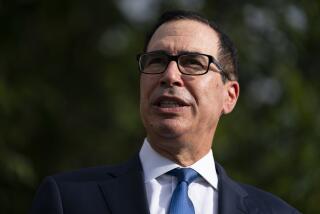Sale of IndyMac to partnership is likely
- Share via
The Federal Deposit Insurance Corp. is nearing a deal to sell IndyMac Bank to a partnership of private New York investors, nearly six months after the Pasadena mortgage lender was taken over by regulators.
The partnership includes buyout expert J. Christopher Flowers, hedge-fund operator John Paulson and Steven Mnuchin, chairman of private equity firm Dune Capital Management, a person familiar with the matter said Monday.
IndyMac spokesman Evan Wagner said no deal had been signed as of late Monday. But he said an announcement was likely by Wednesday, the last day of the year and the target the FDIC had set for a sale.
None of the investors in the partnership could be reached for comment.
Mnuchin is one of two former Goldman Sachs Group Inc. real-estate fund managers who founded Dune Capital in 2004. The firm is best known for stalking opportunistic real estate investments. Mnuchin’s interest in a deal for IndyMac was first reported Friday.
Flowers, founder and chairman of buyout firm J.C. Flowers & Co., has been approved by bank regulators to buy a troubled Missouri commercial bank. He also is a former Goldman Sachs executive.
Last year, Paulson, who made billions of dollars betting that the housing and mortgage markets would implode, gave $15 million to help the advocacy group Center for Responsible Lending establish the Institute for Foreclosure Legal Assistance.
Pursuing loan modifications to help IndyMac borrowers avert foreclosure has been a top priority for FDIC Chairwoman Sheila Bair, although the agency has found that many mortgage holders are in such dire straits that they can’t be helped. Many others haven’t responded to offers to discuss loan workouts.
If the deal goes through as anticipated, the reborn IndyMac would operate under a new charter granted by the Office of Thrift Supervision, the arm of the U.S. Treasury that oversees savings and loans, several sources said.
The agency, IndyMac’s chief regulator before the lender collapsed, came under fire in a recent report from the Treasury inspector general, which said the OTS allowed IndyMac to alter its financial statements last May in a way that concealed the extent of its problems.
In July, IndyMac was closed by regulators amid a run on deposits. The thrift was weighed down by troubled adjustable-rate mortgages, typically “jumbo” loans made without verifying the borrowers’ incomes.
At last estimate, the debacle was expected to cost the federal deposit insurance fund $8.9 billion, but the terms of a transfer of ownership could change that figure.
Key details of the expected transaction remain unclear, including whether IndyMac customers who had deposits too large to be fully insured by the FDIC would recover their losses.
So far, these depositors have had access to only 50% of their uninsured balances.
It also was unclear to what extent the FDIC, which has operated IndyMac since July, might provide backstops to the deal, perhaps by agreeing to share future losses on the lender’s mortgage portfolio.
Banking consultant Bert Ely of Alexandria, Va., said the FDIC’s $8.9-billion loss figure for IndyMac could rise. He also cautioned that a sale agreement was not a sure thing.
“Given IndyMac’s checkered history, this deal is going to be examined quite closely,” he wrote in an e-mail to The Times.
“I’m not predicting anything,” Ely added in a phone interview. But because of the complexities involved, “until we see a final agreement, I would not be surprised to see this deal blow up.”
--
More to Read
Inside the business of entertainment
The Wide Shot brings you news, analysis and insights on everything from streaming wars to production — and what it all means for the future.
You may occasionally receive promotional content from the Los Angeles Times.











